'We're All Handcuffed': What It's Really Like for Women in Afghanistan, as They Brace for What Comes Next
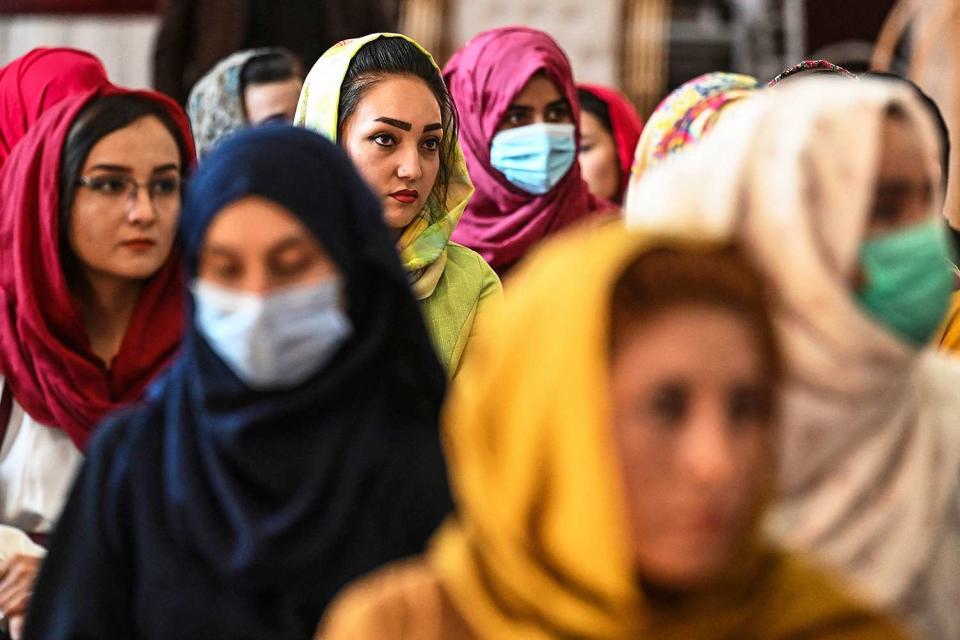
Sajjad Hussain/AFP via Getty Afghan women take part in a gathering at a hall in Kabul on Aug. 2 against the claimed human rights violations on women by the Taliban regime in Afghanistan.
"Afghanistan is hell for women to live," says Dr. Massouda Jalal, the first and — still — only woman to run for president of her country. "The international community helped a lot, but they were helping humans who were living in hell. Some of the problems were getting decreased, but still the problems are going on. Still people are suffering, and joblessness and poverty is a very bad situation."
Last month, after 20 years and trillions of dollars and tens of thousands of dead, the U.S. left Afghanistan and ended its longest-ever war.
The Afghan government quickly collapsed and the Taliban, who first emerged in a civil war in the '90s, returned to power. In the cascading questions and analysis of the American-led coalition's withdrawal was one urgent concern:
What about the women and girls left behind?
Their changing quality of life — expanded education, expanded opportunities — had been seen as one of the signal successes of the war, which ousted a Taliban regime that made girls and women live under what was widely seen as draconian repression.
With the return of the Taliban, observers feared, as one told PEOPLE, that "it would all be erased."
But the truth of what life has been and will be like for women in Afghanistan is not so simple. Women's rights made enormous gains after the 2001 invasion, though these changes were largely experienced in the country's cities, where a minority of the population lives.
Grim realities also persisted, driven by a combination of institutional corruption, cultural attitudes (sometimes cloaked in Islamic teachings that are actually more progressive) and a cycle of poverty and social instability.
A 2018 TIME report detailed what one Afghan attorney and advocate called "a war against women": the staggering rates of domestic violence they faced without consistent legal protection in a society that married them off into relationships over which they had no choice. TIME cited 2014 statistics that 80 percent of those who died by suicide in Afghanistan were women.
One 23-year-old woman, living in the western city of Herat, had tried to burn herself alive to be free of an abusive marriage, she told TIME in 2018. It didn't work.
"Women never have any choices," she said from the hospital. "If I did, I wouldn't have married him. We're all handcuffed in this country."
Jalal, a women's rights advocate and Afghan politician who fled the capital of Kabul in August, tells PEOPLE that "any bad phenomena affects women the worst."
"In those extreme ideologies, there is no place for a woman. Women are enslaved," she says.
Though statistics vary, most women in the country have experienced domestic violence, according to TIME and other reports. Divorces, when they occur, mean the woman loses custody of her sons at age 7 and daughters at age 9.
"They are the poorest women and the most fearful women in the world," Jalal says. "Their life will be at any moment under threat."
In the first few weeks after the Taliban took power — as tens of thousands fled or went into hiding — the militant group's leaders claimed, under the eyes of the international community, that they would be more moderate. But few rules were announced.
That has since started to change.
Officials said this month that some women's sports, like cricket, will be banned where players would be "exposed." Women will still be able to attend school but they will be segregated by gender, which may mean less subjects are available to them, and an Islamic dress code will be enforced. Women at private universities are mandated to wear burqas and cover most of their faces, which, some women protest on social media, is not traditional Afghan clothing.
The new government will also review curricula to, in their view, make classes more Islamic.
The Taliban announced cabinet ministers, but no women were named. The government has also shuttered the Women's Affairs Ministry and replaced it with the Ministry of Vice and Virtue. Under the former Taliban reign, that office functioned as a morality police, responsible for enforcing Sharia (or Islamic) law, and officers beat women whom they deemed were dressed immodestly or were out without a male guardian.
"Women of Afghanistan are already in the worst status in the world," Jalal says, "but if such ideologies are coming into power like [are] now in power, women will go the worst — the worst, the worst."
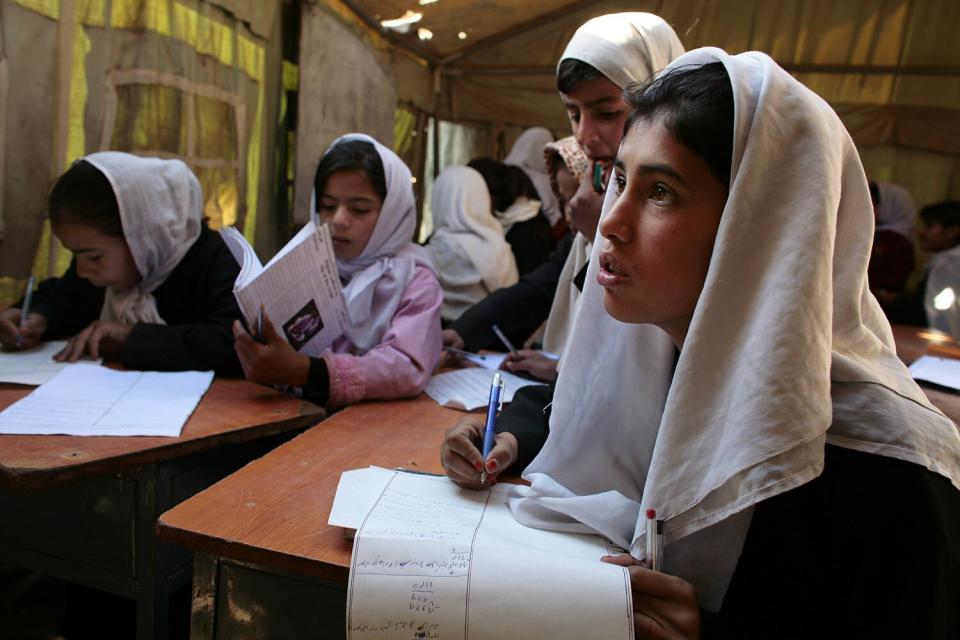
Paula Bronstein/Getty
Challenges and Progress Since 2001
Though about two-thirds of Afghanistan's population of roughly 40 million are under the age of 25 — not old enough to really remember the Taliban's rule before 2001 — today's young Afghan women have heard stories about those days:
When women were forbidden to go to school or hold jobs outside the house, drive a car or even show their faces in public. When they were forbidden to talk to men outside their families, including doctors. When only one in eight women over the age of 15 could read. And when talking with an unrelated man was considered adultery, a crime punishable by stoning until death.
Most music was outlawed, as was technology. "They banned large gatherings, so weddings resembled funerals. When my cousin married in 2000, the attendees who dared to celebrate looked upon the wedding in silence — fearful that the Taliban's Vice and Virtue squad (the so-called moral police) would catch them and penalize them for breaking the law," Wazhma Frogh, co-founder of Afghanistan's Research Institute for Women, Peace and Security, wrote last year.
U.S.-led forces ended five years of Taliban rule in the wake of the 9/11 terror attacks, and America then spent considerable effort and funds to remake Afghan society, including expanding women's education and economic opportunity.
But the Taliban remained a threat and, despite their loss of political power, never completely retreated.
Life for women and girls continued to be perilous. Schoolgirls were attacked with acid thrown at their faces. Hand grenades killed girls in the classroom.
Social and political improvements, too, were uneven and sometimes plagued by bureaucratic dysfunction and corruption.
President Ashraf Ghani, who fled in August just before the Taliban took over, in 2018 told TIME the reality of reform was different on the ground.
"To get to the very nitty gritty, how many girls schools at the age of puberty have a toilet? That's fundamental," he said then. "How many girl schools are three kilometers away? The issue here is that international experts were male-centric. They talked about gender but their pamphlets were glossy and totally lacking content."
Despite his dismissal, though, parts of society made great strides.
Literacy, education levels and professional competence have all increased in the last few years, advocates say. In urban society especially, marriages generally took place only after the consent of both parties.
Jalal ran for president in 2004 — and two more times after that, most recently in 2019 — and two women ran for vice president. There have been women lawmakers, mayors and district governors. And women have become lawyers, judges, teachers, doctors. Some 10,000 were members of the U.S.-trained and armed police force, working alongside male officers.
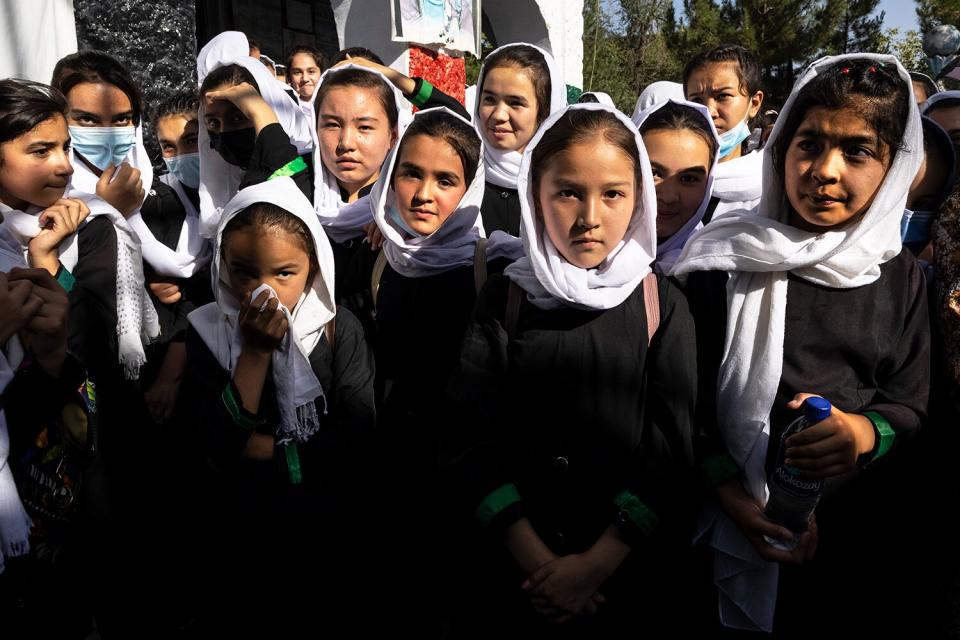
Paula Bronstein/Getty
The increasing number of female doctors and midwives was especially important so that female patients could obtain proper care, preventing more unnecessary deaths from pregnancy-related causes that take the lives of thousands of Afghan women each year. The country's infant mortality rate had been one of the highest in the world. While still high, it sharply decreased in the past 20 years.
Millions of young women have attended schools and universities since 2001. By 2018, 30 percent of women were literate and many became professionals, including civil rights judges and members of parliament.
But in the increasingly large swaths of the country controlled by the Taliban, women were still being deprived of education and jobs, Frogh told PEOPLE from Canada.
A New Yorker investigation this summer showed that in some of the country's rural areas, women and girls lived starkly different lives: dealing with far more conservative attitudes in their villages as well as the frequent threat of violence in the war, which had mostly receded from the cities until the Taliban's last offensive.
Rising Fears After the Fall
Now that the militants have retaken much of the country, despite their claims to rule differently, these gains appear to be in jeopardy for the approximately 18.9 million Afghan women and girls.
Already reports have circulated that fighters asked for lists of girls over age 15 and widows under 45 so they could be married to members of the Taliban, with or without their consent. A spokesman for the group called this baseless "propaganda."
Women who fled the provinces to escape just that predicament hid in Kabul mosques before the fall of the capital in mid-August. Whether the Taliban is forcing marriage on young, unwilling teenage girls and women is hard to know, Frogh tells PEOPLE.
"We don't have a lot of media right now present in Kabul. There is international media that have almost no awareness about the situation, they can't go around, and people don't want to talk to them because they don't want to be subject to any tracks from the Taliban," Frogh says. (More than 100 news organizations, many of them international, have reportedly shuttered or left the country.)
But Frogh imagines it very well could be happening. It once happened to a girl in her extended family and relatives never heard from the girl again. "It's a military tactic. In a society like ours, when you take away somebody's girl or a woman by force, it means you have dishonored that family. So it's about shame," she says.
There are stories of rights rolled back elsewhere: In addition to the changing rules around schooling, women have been stopped on the street if they don't have a male relative with them. Some have been flogged or beaten. Many Afghans are staying put at home, afraid to venture out at all. On TV, religious programs in some instances replaced news and soap operas and women TV reporters were temporarily barred from their offices. Since the government's collapse, the number of women journalists has steeply decreased as well.
Earlier this summer, a mother of four was beaten to death by members of the Taliban and her house was torched because she said she could not cook for them, her family told CNN. (The group denied responsibility.)
One 24-year-old college student in Jalalabad, who asked not to be identified for security reasons, told PEOPLE as the Taliban returned to power that the girls and women in her family, and her female classmates too, had not left home since the militants took control. The women were told not to go to school. Th student, who is engaged to be married, said she worried she would have to cover herself from head to toe now if she ever left the house — but her biggest fear was that fighters would force marriage on her three teenage sisters, two of whom had hoped to be on their way to college to become doctors.
The student said more than a dozen Taliban were living near her family's house. Her mother's blood pressure had risen to over 200.
Women who are able to drive in parts of the country may well lose the privilege, says Kimberley Motley, a U.S. civil rights attorney practicing part-time in the country since 2008. And women who have gotten used to having babies in a hospital with a male doctor could be barred from doing that anymore, too.
"I don't know what the new normal there is going to look like," Motley says, noting that there are female doctors now but women will need a male escort to take them. "Good luck with that," she says.
Motley worries, too, about women who have been able to report crimes like domestic violence to male investigators.
All domestic violence prosecution units in the country have shuttered. And while the cases were difficult to prosecute, now there is no formal legal recourse, according to Frogh.
Taliban spokesman Zabihullah Mujahid promised on Aug. 17 that the group would not impose harsh restrictions on women. However, he added, "Our women are Muslim. They will also be happy to be living within our frameworks of Sharia."
It is becoming clear what that caveat entails. And trust over the Taliban's promises of moderation is understandably elusive.
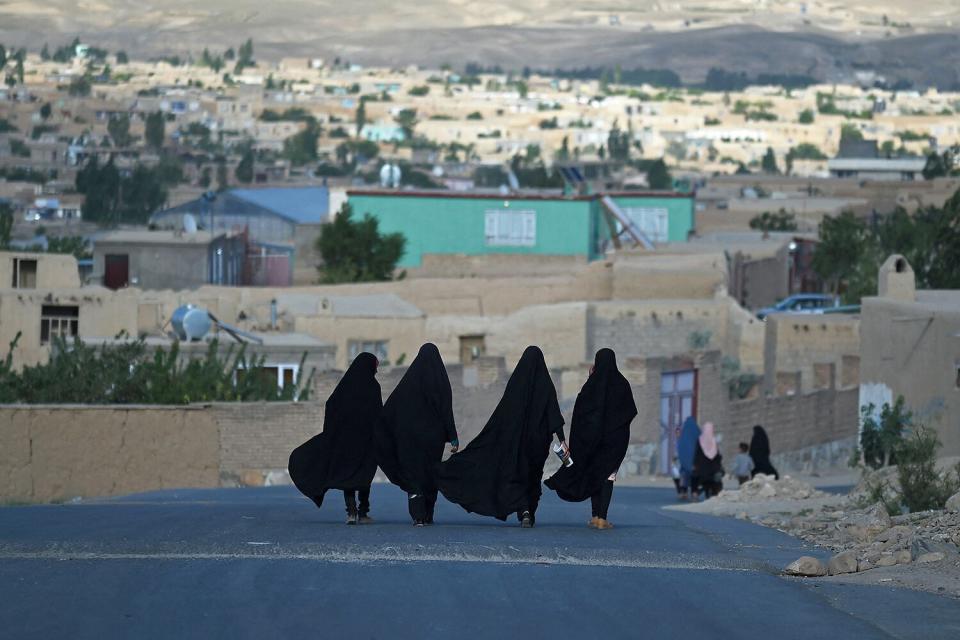
Wakil Kohsar/AFP via Getty
"If it's not 1996, then why are there girls in Herat not going to university? If it's not 1996, why are women being sent from Azizi Bank to home?" Pashtana Durrani, executive director of an educational nonprofit, asked during an NPR interview in August. "You have to understand saying one thing and then sending off a different message on the ground, those are two different things that the Taliban are selling the stories right now."
It's unclear even if all members of the group agree: Taliban leaders suggested last month fighters will need time to be taught how not to "mistreat women."
Stay or Go?
Numerous women are among the 120,000-plus evacuees who fled the country before international forces withdrew at the end of the war in August. Taliban officials urged the country's citizens not to leave, with many calling the flight of accomplished Afghans a brain drain. Among them were members of the national women's soccer team and a noted all-girls robotics team, as well as various advocates.
Some were torn about leaving their homes and their homeland.
"We have a lot of lands in the country, we have a lot of gardens," says Frogh, who thought her escape to Canada to avoid the ire of a convicted rapist she put in jail would be temporary. Now she realizes she may never be able to return. "The work that I was doing was very, very important for hundreds of people and the organization — all of that vanished. My home that I built for my family, all of that vanished."
Others don't want to leave parents who may be unable or unwilling to go.
Women who stayed are in fear of what may come. "People have started self-censoring, just like myself. I had a huge social media following, 168,000 people, and I closed that for the safety of the women and girls who I work with. I couldn't continue with that because of the threats posed to my family," Frogh says. She stayed in daily touch with 250 women lay leaders after the government collapsed, but that's down to 50 now.
She's not sure what happened to the rest.
Frogh says some women are burning any evidence of a past — diplomas, photos of meetings with the U.S. ambassador — that could anger the Taliban.
Khalida Popal, a founder and former captain of Afghanistan's women's national team now in Denmark, reportedly messaged players to burn their jerseys and take down their photos. At least 75 players evacuated to Australia.
Deadly Danger
There is real cause for concern: Taliban fighters have gone door to door asking people if they are journalists, in the military, or work with foreigners, friends in Afghanistan have told Motley, the civil rights attorney.
Mujahid, the group's top spokesman, has claimed any door-to-door raids are being conducted by imposters who should be brought to justice.
Frogh describes a different reality.
"We have had these women who were providing safe havens or shelters for women who had to leave their homes because of violence. These women helped them get legal aid, get to the courts and find a space to live. The Taliban already started targeting them," she says. "The organizations that they work with [are from] the U.S., Canada and others, and they are considered the enemy to the Taliban. They call these women 'Western puppets.' "
Hundreds of targeted assassinations were carried out this year as the Taliban took over more and more territory — before they pledged to rule peacefully. Frogh says 61 journalists, activists, female police and politicians were killed by August, and the number is now reportedly more than 200. Tactics varied: In some cases people were killed by bombs planted in their cars; other times they were attacked at restaurants or on their way to work, when they were surrounded by armed motorcyclists.
Fawzia Koofi, a women's rights advocate and the first female deputy speaker of Afghanistan's parliament, survived two assassination attempts last year. She was under house arrest when she left on the last U.S. airlift and is not staying quiet.
"After 20 yrs of US/NATO presence & all promisses [sic] made to our civil society, women &youth, that chapter has abrubptly closed. Our wealth is our young girls and boys.Those in and those who will come back.Taliban, hear us out: we must rebuild together! This land belongs to all of us," Koofi wrote on Twitter after leaving.
U.N. Secretary-General António Guterres said in August that it was "particularly horrifying and heartbreaking to see reports of the hard-won rights of Afghan girls and women being ripped away from them."
"We have to figure this out," Motley tells PEOPLE of the Taliban takeover, so that the women aren't covered up and "confined to their homes for the rest of their lives."
The forced marriages of teen girls had slowed in parts of the country in recent years, Motley says, because there were legal consequences. She litigated some major cases, such as a preteen who was forced to marry a 40-year-old and then was starved, beaten and burned because she would not obey him and his family and become a prostitute.
Under the new regime, Motley fears it will be, "frankly, government sanctioned."
She believes that as the days go on and there's less attention from the outside world, the Taliban will become more aggressive with women on the street.
"They just want to be free," she says. "I think if you landed a plane in Afghanistan, I don't think there's a person that wouldn't just get on it, even if they didn't know where it was going."
What Comes Next? 'We Cannot Just Leave Them'
Motley says women outside of Afghanistan must help: "We cannot just leave them to their own devices. If we don't do anything, we are creating an open-air prison for every single female in that country."
Women need a man's permission to get the required documents for passports, Motley says. "You're essentially stateless. ... Afghanistan will fail if women are forced into the home. They will fail miserably — and there's already signs they are trying to erase women from society."
Women for Afghan Women, the largest women's organization in Afghanistan, has evacuated centers, pausing operations and trying to provide safe shelter and aid to thousands of women, children and staff.
Former First Lady Laura Bush and Angelina Jolie, a special envoy for the U.N. Refugee Agency, told PEOPLE in August that other countries must not forget about Afghanistan.
"We are connected globally in ways we never have been before," Jolie said then. "We have an opportunity to make that count: to stay alongside the people of Afghanistan who are struggling to stay hopeful and are desperate to avoid new levels of violence and persecution in their country.
Women who have gained power and notice for advancing human rights and gender equality are especially fearful. They say they have received threatening phone calls — "you're next" — and Taliban members have gone into their homes and organizations and looked through their files.
"There's every reason to worry," says Melanne Verveer, executive director of Georgetown Institute for Women, Peace and Security. "It's fiction that these are different Taliban. After all of this progress, it would all be erased."
Women's rights advocates who have been working tirelessly in Afghanistan are devastated at the scale of the potential loss. The Jalalabad college student in hiding said women think about rebelling every day, but "there is no one to hear their voices."
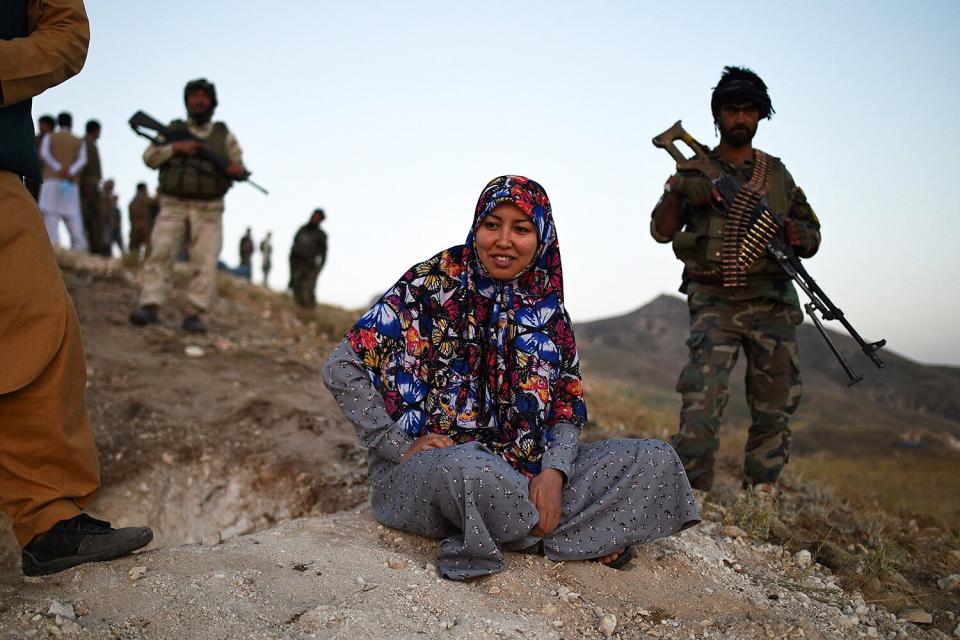
Farshad Usyan/AFP via Getty
"Sometimes I think my tears have dried up," Frogh says. "It's continuous, painful conversations — trying to help one who's on the run or trying to help women who are burning their documents, burning the pictures they took of events that we had or burning their education documents, anything that would show that they are an active or educated person."
"I'm thinking about a country where millions of women are educated and living in hiding. That can't hold, can it?" Frogh says. "At the same time I see that even in their first, second days of the Taliban in Kabul, five women came out and said, 'We can't accept this.' Five women holding a placard isn't going to do it, of course, but that shows that people are willing to stand up."
Indeed, Afghan women have staged several protests demanding the right to education, work and security, even marching to the presidential palace in the capital. Some were beaten and bloodied and guns were fired in the air to encourage them to disburse.
Jalal is pessimistic about such efforts: "It will not have an effect. We were doing what we believe when we were in power. We were democratic. They are doing what they believe when they are in power."
The Taliban thinks "people will tire and they will go home and that's it," Jalal says. "If they are not shooting, it's because of the media."
A recent pro-Taliban women's demonstration featured 300 people completely covered in black with heavily armed guards and signs in English declaring their support for the new administration.
The solution, Jalal believes, is for the international community to come together and encourage an inclusive government to replace this one. The Taliban should be invited to participate. Women too.
Beyond pockets of protest, fighting continues in Afghanistan — including armed resistance in the north. The Taliban, meanwhile, must now run a country, which means overseeing an economy and administering an array of services.
Jalal remains optimistic that the Taliban regime will not hold. "Such chaos is going on, it is not durable," she says. "With what will they be sustaining themselves? Money is closed, banks are closed. Military fell apart. ... Resistance has already started. Day by day, the chaos will go wider and deeper and internal war may start."
At an international conference earlier this week, U.N. officials warned that, with 14 million Afghans facing starvation and widespread uncertainty about the resumption of civil and financial services, the country could soon fall into an "abyss" fueled by "catastrophic conditions." The U.S. and other countries have pledged more than $1 billion in aid and supplies.
Afghan women, as ever, will bear the brunt of the chaos.
"Women are more vulnerable to all miseries — to sickness, to illiteracy, to ignorance, to diseases, to poverty," says Jalal. "Poverty in Afghanistan has a female face because they are deprived from ownership and to access to economic opportunities, to banking services, to loans to jobs from long ago."
There is no time to spare. "Freedom seekers, others are in danger. Men and women. If they come out of their hiding places there is the risk that they will be killed" — including her husband, who is in hiding. "They are intellectual assets in the country. We need them and we shouldn't lose them."
Razia Jan, an Afghan native and Los Angeles benefactor of a girls' school outside Kabul, told PEOPLE in August she remained undaunted — at least when it came to her classrooms.
She said she had been successful in persevering her students' access to her school, which opened in 2008, even under Taliban rule. Education gives girls a foundation too valuable to give up.
"They want all the girls who go to school to wear burqas, and younger girls will wear hijab," Jan said. "And we don't care."
To make sure her students got to school safely, she's been sending the school bus.
If you would like to support those in need during the upheaval in Afghanistan, consider:
* Donating to UNICEF to aid Afghans in the country or
* Donating to the International Refugee Assistance Project to help those fleeing.

 Yahoo Finance
Yahoo Finance 